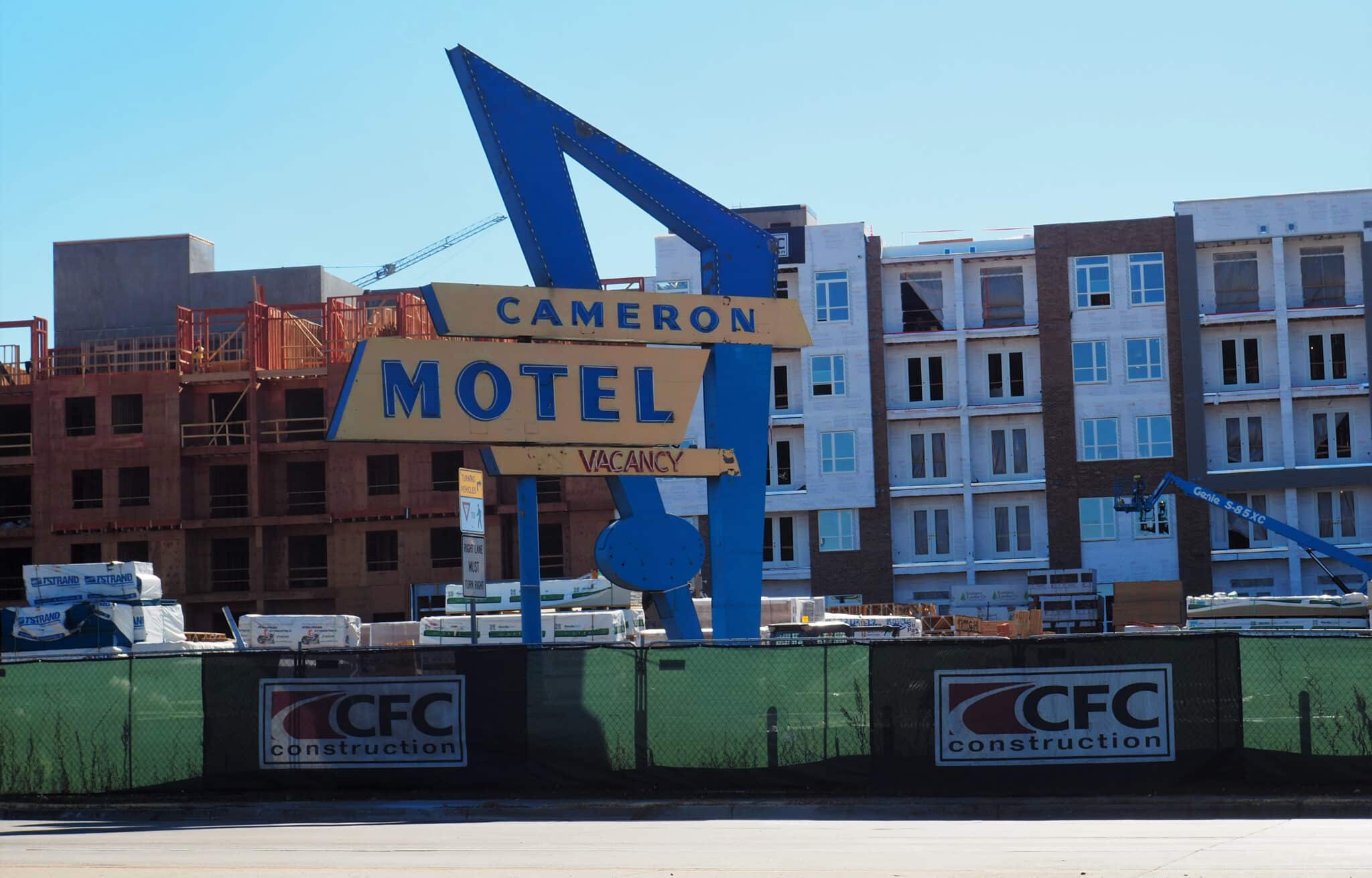
Flywheel Capital’s property at the I-25/Evans Avenue interchange, as it appeared in October 2021. (BusinessDen file)
A half-dozen jurors chosen Tuesday will be tasked with unraveling a bitter, yearslong feud between two Denver real estate developers, with as much as $22 million at stake.
Their expected nine-day civil trial will cap off 27 months “of grueling litigation,” in the words of the plaintiff, and highlight allegations of theft, fraud and other criminal behavior. At the center will be two men who together built a company with a nine-figure portfolio.
Flywheel Capital, a commercial real estate investment and development firm, was formed in 2017 by Ben Hrouda. The next year, Adam Hazlett joined as a co-owner. Both men owned 50 percent of the corporate entities that together made up Flywheel.
By all accounts, the company thrived in its earliest years, converting a former assisted living facility at 4550 W. Colfax Ave. in Denver into condominiums and building an apartment complex on about 5.5 acres by the I-25/Evans Avenue interchange. Between 2017 and 2019, Flywheel’s assets grew in value from $7 million to $100 million, according to both owners.
“For the most part throughout 2018 and 2019, Mr. Hrouda and Mr. Hazlett got along well, worked effectively together and…successfully executed a collaborative divide-and-conquer strategy with respect to each of Flywheel’s investments,” Hazlett’s attorneys say.
That amicable co-ownership ended in late 2019 or early 2020, depending who you ask, as a result of wrongdoing by either Hrouda or Hazlett, depending who you ask.
Hazlett claims to have discovered that Hrouda was committing investor fraud by commingling cash. For example, when he failed to raise enough money for the I-25/Evans property, Hrouda took $600,000 from a separate pool of investor money and used it for that, then raised additional money from unsuspecting investors to backfill the hole, Hazlett said.
Hrouda outright denies commingling cash and accuses Hrouda of causing their rift by starting a competing firm, Victory Investment Partners, in September 2019, using a logo identical to Flywheel’s, and snatching two of Flywheel’s prospective investments in Estes Park.
Both sides agree that by early 2020, Hazlett wanted out of Flywheel and Hrouda agreed to buy Hazlett’s shares. But the two couldn’t agree on what the entities were worth, then couldn’t agree which of the two appraisers they’d hired was right. So, a standstill ensued.
Hrouda, meanwhile, created new LLCs, which had the same name as the LLCs he co-owned with Hazlett but with the number 2 after each. Hazlett claims that Hrouda has continued to run Flywheel through these new entities, excluding him. Hrouda denies that.
In October 2021, Hazlett sued Hrouda. His lawsuit, which has been amended several times, accuses Hrouda of stealing Hazlett’s half of Flywheel’s profits, defrauding investors, breaching contracts and dealing in bad faith. Hazlett claims that he is owed $22 million in past Flywheel profits, plus interest, and that Hrouda should pay his mound of attorney fees.
“From as early as two weeks into the parties’ partnership, when Hrouda deposited an investor’s check made out to Flywheel into his personal bank account, and continuing for years thereafter,” Hazlett’s attorneys wrote in a court filing Dec. 29, “Hrouda has cut corners at every opportunity to ensure his personal success at the expense of Hazlett, Flywheel’s investors, banks, lenders and virtually anyone else with whom Hrouda has done business.”
For his part, Hrouda said that Hazlett doesn’t own half of Flywheel and hasn’t since the 2020 buyout, so jurors need to determine only how much Hazlett is owed from that sale. Because Hazlett hasn’t been a co-owner, he’s not entitled to Flywheel’s recent profits, Hrouda said.
“Hazlett has breached his duty of good faith and fair dealing in the original Flywheel entities’ operating agreements and/or competed with the original Flywheel entities in breach of the non-compete clause,” Hrouda’s attorneys wrote Dec. 29, “by forming and operating Victory Investment Partners in 2019 while still purporting to be a manager and/or member of the original Flywheel entities, and then usurping the Estes Park investment.”
Both Hrouda and Hazlett will testify at the trial, according to witness lists provided to Judge Stephanie Scoville, and their testimony is expected to take up several days.
Tuesday’s trial almost didn’t happen. Hrouda’s attorneys asked for a continuance last month and, when Scoville denied that, tried to move the case to federal court last week, claiming that Hrouda’s copyright infringement allegation is a federal matter. At a hearing Thursday, Scoville refused to cancel the trial and sanctioned Hrouda and his lawyers for their gamesmanship, ordering them to pay a sliver of Hazlett’s attorney fees.
Through their lawyers, Hazlett and Hrouda both declined to discuss the upcoming trial.
Hazlett is represented by Lauren Thompson, Erin O’Neill and Melanie MacWilliams-Brooks with Foster Graham Milsten & Calisher, plus Ted Rosen from Rosen Thompson Rosen.
Hrouda is represented by Peter Gergely, Kristen Souther and Ryan Fletcher with Merchant and Gould, along with Steven Woodrow from Woodrow and Peluso.

Flywheel Capital’s property at the I-25/Evans Avenue interchange, as it appeared in October 2021. (BusinessDen file)
A half-dozen jurors chosen Tuesday will be tasked with unraveling a bitter, yearslong feud between two Denver real estate developers, with as much as $22 million at stake.
Their expected nine-day civil trial will cap off 27 months “of grueling litigation,” in the words of the plaintiff, and highlight allegations of theft, fraud and other criminal behavior. At the center will be two men who together built a company with a nine-figure portfolio.
Flywheel Capital, a commercial real estate investment and development firm, was formed in 2017 by Ben Hrouda. The next year, Adam Hazlett joined as a co-owner. Both men owned 50 percent of the corporate entities that together made up Flywheel.
By all accounts, the company thrived in its earliest years, converting a former assisted living facility at 4550 W. Colfax Ave. in Denver into condominiums and building an apartment complex on about 5.5 acres by the I-25/Evans Avenue interchange. Between 2017 and 2019, Flywheel’s assets grew in value from $7 million to $100 million, according to both owners.
“For the most part throughout 2018 and 2019, Mr. Hrouda and Mr. Hazlett got along well, worked effectively together and…successfully executed a collaborative divide-and-conquer strategy with respect to each of Flywheel’s investments,” Hazlett’s attorneys say.
That amicable co-ownership ended in late 2019 or early 2020, depending who you ask, as a result of wrongdoing by either Hrouda or Hazlett, depending who you ask.
Hazlett claims to have discovered that Hrouda was committing investor fraud by commingling cash. For example, when he failed to raise enough money for the I-25/Evans property, Hrouda took $600,000 from a separate pool of investor money and used it for that, then raised additional money from unsuspecting investors to backfill the hole, Hazlett said.
Hrouda outright denies commingling cash and accuses Hrouda of causing their rift by starting a competing firm, Victory Investment Partners, in September 2019, using a logo identical to Flywheel’s, and snatching two of Flywheel’s prospective investments in Estes Park.
Both sides agree that by early 2020, Hazlett wanted out of Flywheel and Hrouda agreed to buy Hazlett’s shares. But the two couldn’t agree on what the entities were worth, then couldn’t agree which of the two appraisers they’d hired was right. So, a standstill ensued.
Hrouda, meanwhile, created new LLCs, which had the same name as the LLCs he co-owned with Hazlett but with the number 2 after each. Hazlett claims that Hrouda has continued to run Flywheel through these new entities, excluding him. Hrouda denies that.
In October 2021, Hazlett sued Hrouda. His lawsuit, which has been amended several times, accuses Hrouda of stealing Hazlett’s half of Flywheel’s profits, defrauding investors, breaching contracts and dealing in bad faith. Hazlett claims that he is owed $22 million in past Flywheel profits, plus interest, and that Hrouda should pay his mound of attorney fees.
“From as early as two weeks into the parties’ partnership, when Hrouda deposited an investor’s check made out to Flywheel into his personal bank account, and continuing for years thereafter,” Hazlett’s attorneys wrote in a court filing Dec. 29, “Hrouda has cut corners at every opportunity to ensure his personal success at the expense of Hazlett, Flywheel’s investors, banks, lenders and virtually anyone else with whom Hrouda has done business.”
For his part, Hrouda said that Hazlett doesn’t own half of Flywheel and hasn’t since the 2020 buyout, so jurors need to determine only how much Hazlett is owed from that sale. Because Hazlett hasn’t been a co-owner, he’s not entitled to Flywheel’s recent profits, Hrouda said.
“Hazlett has breached his duty of good faith and fair dealing in the original Flywheel entities’ operating agreements and/or competed with the original Flywheel entities in breach of the non-compete clause,” Hrouda’s attorneys wrote Dec. 29, “by forming and operating Victory Investment Partners in 2019 while still purporting to be a manager and/or member of the original Flywheel entities, and then usurping the Estes Park investment.”
Both Hrouda and Hazlett will testify at the trial, according to witness lists provided to Judge Stephanie Scoville, and their testimony is expected to take up several days.
Tuesday’s trial almost didn’t happen. Hrouda’s attorneys asked for a continuance last month and, when Scoville denied that, tried to move the case to federal court last week, claiming that Hrouda’s copyright infringement allegation is a federal matter. At a hearing Thursday, Scoville refused to cancel the trial and sanctioned Hrouda and his lawyers for their gamesmanship, ordering them to pay a sliver of Hazlett’s attorney fees.
Through their lawyers, Hazlett and Hrouda both declined to discuss the upcoming trial.
Hazlett is represented by Lauren Thompson, Erin O’Neill and Melanie MacWilliams-Brooks with Foster Graham Milsten & Calisher, plus Ted Rosen from Rosen Thompson Rosen.
Hrouda is represented by Peter Gergely, Kristen Souther and Ryan Fletcher with Merchant and Gould, along with Steven Woodrow from Woodrow and Peluso.


